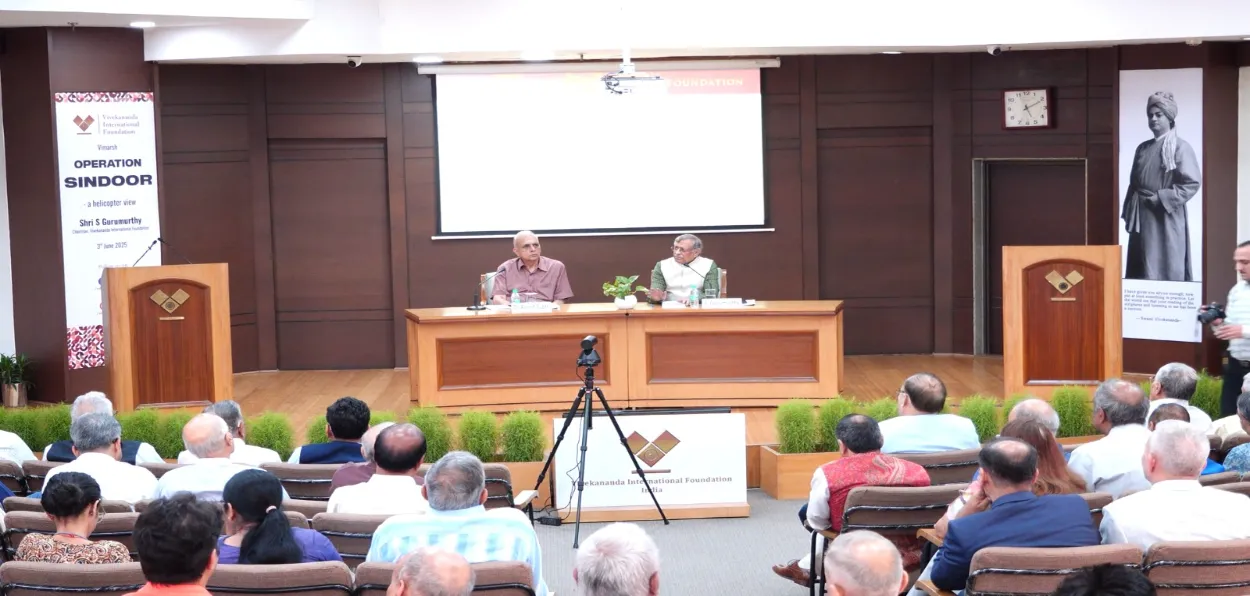
Vidushi Gaur/ New Delhi
Operation Sindoor, launched against Pakistan, is a pivotal national security and geopolitical strategy, and it marks a “paradigm shift in Indian warfare, said noted economist S Gurumurthy.
In his thought-provoking analysis of the Operation, Gurumurthy, chairman of the Vivekananda International Foundation (VIF), a Delhi-based strategic think tank, described Operation Sindoor as a game-changing moment in India’s security history. “Operation Sindoor is not just a military strategy; it is a declaration of India's arrival as a power to reckon with militarily, economically, and culturally.”
The event was attended by scholars, policymakers, veterans, and members of India’s strategic community. In his address, Gurumurthy noted that while India had long been recognised globally for its culture and philosophical contributions, the past 14 years had redefined its global image.
“From a soft power rooted in spirituality and civilization, India is now being seen as a rising hard power. That shift was unthinkable two decades ago,” he said.
He emphasised that Operation Sindoor has helped reconfigure this perception by showing India’s preparedness and strategic resolve. “This is not the India of 1947 or even 1999. This is the India of 2025, confident, capable, and self-reliant.”
Referring to the Pahalgam terrorist attack, Gurumurthy said the (Pakistan-backed) terrorists asked the tourists their religion before killing them. "That is not just terrorism; it is religious terrorism."
He said the perpetrators of the Pahalgam attack wanted to ignite internal hatred within India.“They wanted Hindus to hate Muslims in India. But what happened? Hindus and Muslims both stood united, in outrage, in grief, and in resolve. Pakistan completely miscalculated,” he said.
.jpeg) Charman, VIF, S. Gurumurthy
Charman, VIF, S. Gurumurthy
Calling out Pakistan's longstanding hostility toward India, Gurumurthy said, “Pakistan’s nationalism and survival are based entirely on defeating India. Its national identity is not positive, it is reactionary."
Tracing the roots of Operation Sindoor, Gurumurthy revealed that the groundwork began in 2015 when India started silently preparing for "Zero-contact warfare.” The tipping point, he said, came in 2019, when India’s defence forces demonstrated a new form of operational readiness.
“2019 was a turning point. The military was prepared, and the political leadership gave the go-ahead. It was precise, it was powerful, and it was invisible. That’s the beauty of modern warfare, you win without being seen,” he said.
Gurumurthy drew attention to Prime Minister Narendra Modi’s 2017 visit to Israel, the first-ever by an Indian Prime Minister, as a crucial diplomatic move that later bore fruit during Operation Sindoor. “At that time, fingers were pointed by the opposition, the media, and even internationally. But had Israel not stood with India in 2025, things would have been very different,” he emphasised.
Gurumurthy said that Israeli support, likely in terms of intelligence and technology, played a critical role in enhancing India's military capabilities.
.jpeg) Dr. Arvind Gupta, Director of VIF (left) and Chairman, VIF, S. Gurumurthy (Right)
Dr. Arvind Gupta, Director of VIF (left) and Chairman, VIF, S. Gurumurthy (Right)
According to Gurumurthy, four foundational strengths enabled the success of Operation Sindoor:
Gurumurthy said that Operation Sindoor is not just about military dominance but about restoring India's cultural and civilisational confidence. “We are not a nation built on conquest. We are a nation built on consciousness. But now, we will not allow our consciousness to be attacked without consequence,” he said.
READ MORE: From Lucknow’s lanes to the world stage: Hockey star Mumtaz Khan
Gurumurthy asked Indians to stay united and alert. “This is not the end. It’s the beginning of a new phase of India’s journey, one that demands clarity, unity, and readiness. We must not let complacency creep in.”
The address was followed by a lively question-and-answer session where participants raised issues ranging from cyber warfare to border diplomacy. The overwhelming sentiment in the room was one of renewed confidence.
